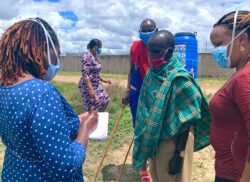
In rural areas and informal settlements – mainly slums in cities and towns – people hardly seek health services. There are myriad reasons for this, including long distances to health centres, indifference to health-seeking behaviour and cost factors.
But most of these places are served by community members known as Community Health Volunteers (CHVs), intertwined with Community Health Workers. These are basically the same, although the former implies that they volunteer without getting payment. We will discuss this shortly.
In a roundtable meeting held in Nairobi in 2018 by a media development NGO, a Community Health Worker, Mr Patrick Malachi from Kibra, narrated his story. He said he was born and brought up in Kibra and he has been volunteering as a health worker since 2009. Though he has no medical training, the people refer to him as ‘doctor.’ He earned this respected moniker from his act of walking through the garbage strewn, narrow streets of Kibra villages, from house to house, door to door, urging the people to live healthily by observing basic hygiene. If need be, he connects them to the formal health system.
He also encourages women to seek antenatal care, deliver at health facilities, take their children for immunisation, and observe hygiene.
Community Health Volunteers (CHV) are identified by local communities countrywide and trained by the government or non-governmental organisations to address basic primary health services. A CHV acts as a catalyst and agent of change to enable people take control and responsibility for their health matters.
Speaking at the same venue, Mr Daniel Kavoo, Head Programme Officer at the Division of Community Health Services, Ministry of Health, said communities hold in high esteem CHVs who provide preventive, promotive and basic curative services because they understand them better and they are one of their own.
Unfortunately, CHVs are usually not paid for their work. Dr Githinji Gitahi, the CEO of Amref Health Africa and co-chairman of UHC2030 Steering Committee, while acknowledging that the government recognises the important work CHVs do, added that to achieve UHC, the government must integrate CHVs to the healthcare workforce.
“They (CHVs),” he said, “are hardly recognised in the formal sector, though they are critical in expanding access to primary healthcare. They either work on voluntary basis, or with little pay; this is not acceptable.”
Kenya has had a Community Health Strategy since 2006, which was revised in 2014 to respond to the devolved governments. Its main aim is to empower individuals, households and communities to demand services from all providers and to know and progressively realise their rights to equitable, high quality healthcare as provided for in the Constitution.
In a speech by then Health Cabinet Secretary Sicily Kariuki, during a WHO gathering, she said that in order to achieve UHC the country needs to tackle major barriers that include inadequate trained healthcare workers, including the community health workforce. She added that the country is making progress to address the shortage of community health personnel through rolling out Community Health Extension Workers Curriculum at Kenya Medical Training College (KMTC). The curriculum has been developed, pre-tested and adopted by KMTC.
Community Health Extension Workers are the supervisors of Community Health Volunteers. Unlike the latter, they are paid salaries. The government says the training will borrow from the Cuban model of training Family Health Medicine Clinical Officers and Nurses. By 2018, 800 Community Nurses had been enrolled. After the training, they will be put on government payroll and sent to the communities they come from to serve households.
The ministry says that by 2018, Kenya had established 5,309 Community Health Units, which is 55 percent of the total population coverage, with a workforce of 97,335 community health personnel and with plans to establish more community health units (4,261) and recruit a workforce of 100,000.
There are also plans to provide each Community Health Volunteer with a yearly stipend of Ksh24,000, a work kit which contains both basic medical equipment, stationery for data collection, and basic preventive and curative drugs.
